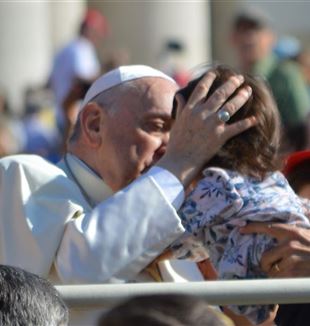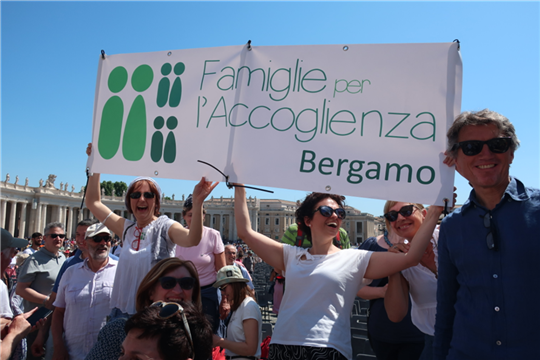
"Keep up the good work, continue in this embrace"
Six hundred adults and children from the Families for Hospitality Association met in St. Peter's Square in Rome, on May 18, for an Audience on the occasion of the Association's 40th anniversary."There are moments that remain in history," Simone told me on the train, as we were tired and happy on our way back from Rome to Milan after celebrating the 40-year history of the Association of Families for Hospitality with 600 other friends. It is a story that spans several generations and continually flourishes thanks to these young families who, during this time when everything seems to be closed to hope, open themselves to hospitality. The latest frontier have been the dozens of families who have welcomed Ukrainian refugees, some of whom accompanied us to St. Peter's Square for the general audience with the Pope. Hospitality knows no borders or age, and so I was able to see old friends again who over the years have built small or large works of hospitality. These are foster families, adoptive families, families who over time have carried their vocation to the point of giving life to welcoming homes, giving new life to a culture of hospitality that draws its source in the relationship with Fr. Giussani as recounted in the book: The Miracle of Hospitality. Miracle, that is, res mirabilis (wondrous thing, to be seen), which we saw yesterday in the sun-baked St. Peter's Square where young couples with their children stood next to other white-haired friends listening to the Pope's Wednesday catechesis.
The Pope invited us to look at Job who, having reached his old age, cries out in protest against evil, and God responds to him with tenderness. Job has lost everything, his fields, possessions, children, his health, but in the end God takes to the floor, letting it be understood behind his silence. Job's friends, indeed, claimed to know everything about his pain, but may God, the Pope warned, preserve us from the moralism of those who always know how to set things right without experiencing contradiction and human frailty.
For those of us who are immersed in this human frailty every day, the feeling is that we are dealing with a person who has also been through it, of a Pope who has lived the experience of hospitality. Thus, each of us had the impression that the Holy Father read our hearts, felt understood to the core, even in those dark moments when prayer becomes a cry, the cry of Job. Then evoking the recent suffering of the pandemic and the war in Ukraine, Pope Francis asked, "Can we justify these “excesses” as the higher intelligence of nature and history? Can we religiously bless them as justified responses to the sins of victims, as if they deserve it? No, we cannot." In fact, there is, he explained, a kind of "right that victims have to protest vis-à-vis the mystery of evil, a right that God grants to everyone, that indeed, he himself inspires, after all.” And it is precisely this protest that can be a form of prayer: a child who protests to their parents – something we all understand perfectly – asks them for special attention. Thus the turning point of the conversion is at the very climax of Job's cry of pain, when he can finally say, "My eyes will behold Him, and not as a stranger.”
God likes Job's protest, his entrusting, as someone who knows that God is not his "persecutor," and having reached old age, he can say, "My God will come and do me justice." At the end of the catechesis, in his final greetings, Francis addressed our families thus: "I greet the Association of Families for Hospitality, which is dedicated to adoption, taking care of children and the elderly in difficulty: you persevere in faith and in the culture of welcoming, thus offering a beautiful Christian witness and an important social service. Thank you, thank you for what you do." Then, meeting with President Luca Sommacal together with some families of the association, he added, spreading his arms wide, "Keep up the good work, continue in this embrace."
This was followed by Mass at the Altar of the Chair of St. Peter's Basilica, celebrated by Fr. Marco Vianelli, director of the Italian Episcopal Conference's Office for the Pastoral Care of Families. Fr. Vianelli, who knows the association, spoke about the "jubilee" of Families for Hospitality, stressing the historical value of the day, adding that the reading of the day, taken from the Acts of the Apostles, seemed written just for us: "You have come here to this new Jerusalem from many parts of Italy," to "share this life of yours with the Church." Fr. Vianelli encouraged us to seek, like Paul and Barnabas, new paths for a new age, to cherish our history without nostalgia, to seek the answers to today's questions together. Thus those who abide in Him bear dynamic fruit, for "you are not bonsai trees, very elegant but that do not bear fruit." Love, he concluded, "which is always something handmade," is called to bear fruit.
Read also - Where life happens
At the end of the day, Marco wrote: "I am a 50-year-old father and husband in the midst of his journey of hospitality. Hospitable, as Luca said today, because welcomed. I was welcomed into this companionship that, coexistence after coexistence, occasion after occasion, face after face, increases the taste for the other a hundredfold.”